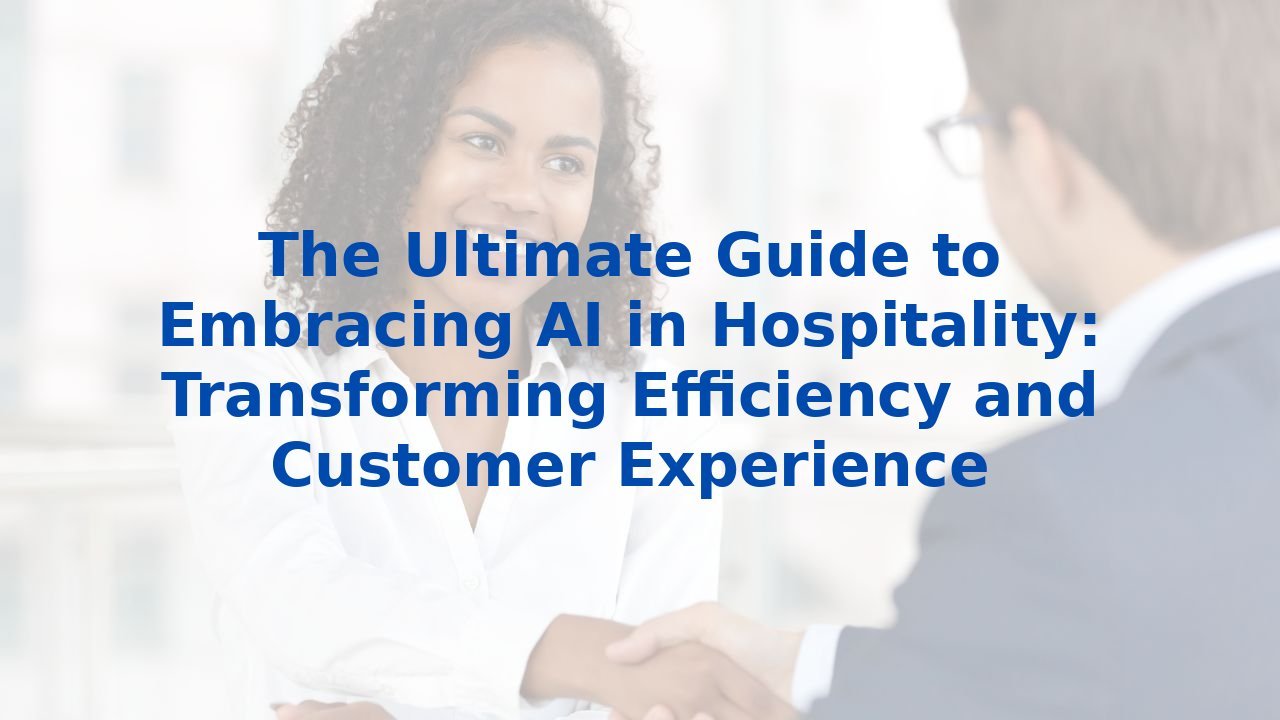The Ultimate Guide to Embracing AI in Hospitality: Transforming Efficiency and Customer Experience
The Ultimate Guide to Embracing AI in Hospitality: Transforming Efficiency and Customer Experience
Introduction
The hospitality industry stands on the precipice of a monumental transformation, one ushered in by the integration of artificial intelligence (AI). This is not just a trend; it's a revolution that’s changing how hotels and resorts operate and engage with their guests. In this guide, we will delve into the multifaceted ways that AI is enhancing operational efficiency and customer experience, paving the way for a brighter future in hospitality.
The Rise of AI in Hospitality
As we look at the landscape of hospitality, it’s clear that AI is no longer an optional innovation but a necessity. From streamlining operations to creating personalized experiences, AI is reshaping the industry in several key areas:
1. Operational Efficiency
One of the most significant advantages of adopting AI is its ability to automate mundane tasks. Tasks that once occupied countless hours, such as room assignments, check-in processes, and guest inquiries, can now be managed more efficiently. Imagine an AI-powered chatbot that can handle multiple guest requests simultaneously, allowing your staff to dedicate their time to more complex, personalized interactions. This level of automation not only reduces the workload for employees but also heightens response times, leading to a seamless guest experience.
2. Customer Experience
In today’s competitive market, personalizing guest experiences is paramount. AI excels in analyzing vast amounts of guest data—preferences, behavioral patterns, and feedback. This analytical prowess empowers hotels to craft offerings that resonate with individual guests. Additionally, AI can predict future behaviors based on historical data, allowing for tailored promotions and services that cater to guests' needs, ultimately elevating satisfaction and loyalty.
3. Financial Management
Financial health is pivotal to the success of any hospitality business. AI can play a crucial role in optimizing revenue—analyzing market trends, assessing guest behaviors, and even suggesting optimal room rates. Moreover, it can alert management to anomalies in financial data, minimizing the risk of fraud and ensuring transparency. Armed with these insights, hotels can make informed decisions that enhance profitability and sustainability.
Benefits of AI in Hospitality
The integration of AI into hospitality brings forth a wealth of benefits:
1. Improved Efficiency
By automating repetitive tasks, AI allows staff to focus on higher-priority responsibilities, cultivating an environment of increased productivity. This is not just about doing more—it’s about doing better with the resources at hand.
2. Enhanced Customer Experience
When services are personalized to meet the unique needs of every guest, satisfaction soars. AI not only facilitates this customization but also helps nurture lasting relationships through targeted interactions.
3. Data-Driven Decision Making
The power of data is undeniable. AI equips hotels with actionable insights, enabling them to make decisions backed by precise analytics. This approach fosters strategic planning and growth driven by empirical evidence rather than assumption.
Training Employees for AI
While the technological advantages of AI are substantial, the human element remains vital for the successful implementation of these solutions. Training employees in AI applications offers significant benefits:
1. Skill Development
Equipping your workforce with AI-related skills not only maximizes the potential of these tools but also nurtures a culture of learning and adaptability within your organization.
2. Adaptability
With the speed at which technology evolves, having a trained staff makes for a smoother transition into new systems and processes. Employees who understand AI are more likely to embrace change and foster innovation.
3. Improved Collaboration
A well-trained workforce can work in harmony with AI, leveraging technology to enhance their roles rather than viewing it as a replacement. This synergy cultivates a workplace where machines and humans coalesce to achieve greater heights of service and efficiency.
Conclusion
As we venture further into the age of AI, the hospitality industry finds itself at a crucial juncture. By embracing automation, personalization, and data analysis, hotels can not only improve operational efficiency but also create memorable experiences for guests. The investment in training employees to effectively integrate these technologies will pay dividends in adaptability, collaboration, and overall organizational success. The future of hospitality is bright, and AI is leading the way, promising a landscape of innovation and unparalleled service.
To equip your entire workforce with AI skills, consider exploring comprehensive training options to ensure you’re ready for tomorrow’s challenges.



